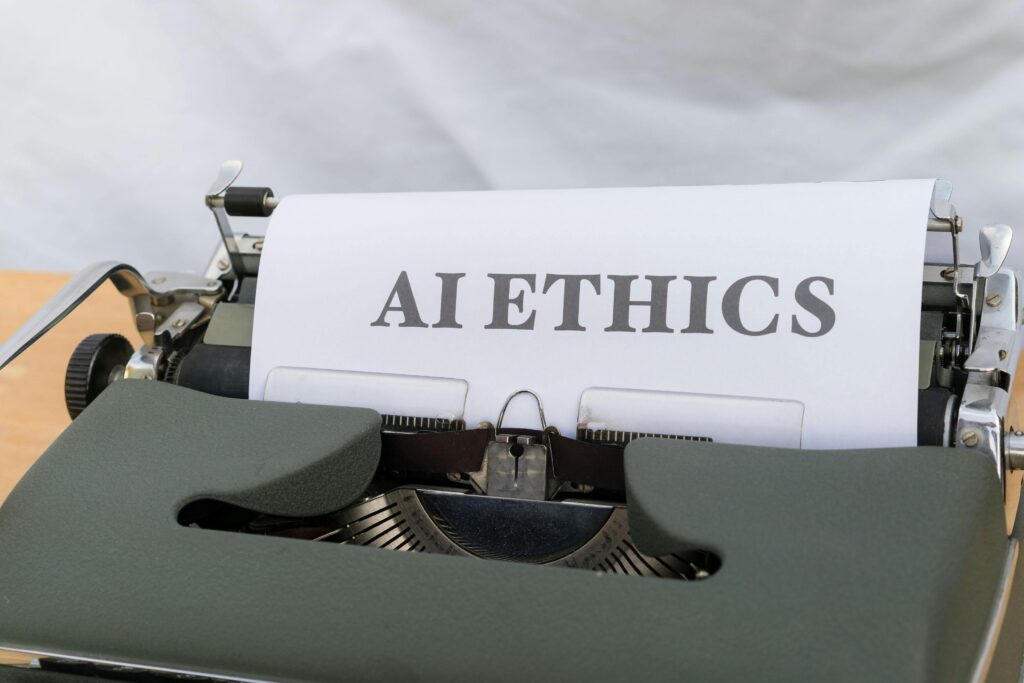AI Ethics: Navigating the Moral Artificial Intelligence – Artificial intelligence (AI) has transformed the manner we stay, paint, and interact with technology. but, as AI becomes greater pervasive in society, the need for ethical considerations will become more and more vital. In this article, we can explore the standards, demanding situations, case research, solutions, and high-quality practices of AI Ethics.
AI Ethics: Navigating the Moral Artificial Intelligence
Creation Of AI Ethics

What’s AI Ethics?
AI Ethics encompasses the moral ideas and tips that govern the development, deployment, and use of synthetic intelligence technologies. It addresses the moral implications of AI systems on individuals, society, and the environment.
Why Is AI Ethics Vital?
Moral considerations in AI ensure that the era is evolved and used responsibly, safeguarding against ability harms including discrimination, privacy violations, and societal inequities. It fosters trust and accountability in AI systems, selling their ethical and responsible adoption.
Concepts Of AI Ethics
Transparency
Transparency in AI includes making the capability, selection-making procedures, and data usage of AI systems understandable and on hand to stakeholders. It ensures accountability and permits users to realize how AI structures function and make decisions.
Duty
Accountability holds developers, deployers, and customers of AI systems answerable for the results of their moves. It establishes mechanisms for addressing and rectifying harms resulting from AI structures, promoting ethical conduct and decision-making.
Fairness
Fairness in AI aims to mitigate biases and make certain equitable consequences for all individuals, no matter their race, gender, or other traits. It includes identifying and addressing bias in AI algorithms, statistics, and decision-making processes to save you from discriminatory practices.
Privateness
Privacy in AI issues the protection of individuals’ private information and statistics from unauthorized get entry to, use, or disclosure. It involves enforcing measures together with records anonymization, encryption, and personal consent to safeguard privacy rights in AI applications.
Safety
Safety in AI makes a specialty of minimizing dangers and risks associated with AI structures to prevent damage to people, society, and the surroundings. It consists of measures inclusive of rigorous testing, robust cybersecurity, and fail-safe mechanisms to ensure the secure operation of AI technologies.
Challenges In AI Ethics
Bias In AI Algorithms
Bias in AI algorithms can result in discriminatory consequences, perpetuating societal inequalities and injustices. Addressing bias calls for records diversity, algorithmic transparency, and non-stop monitoring to detect and mitigate biases in AI systems.
Loss Of Regulations
The absence of comprehensive guidelines and requirements for AI ethics poses demanding situations in ensuring the ethical development and deployment of AI technology. Regulatory frameworks are had to establish clean suggestions and duty mechanisms for AI stakeholders.
Moral Dilemmas in Decision-Making
Ethical dilemmas get up in AI selection-making while conflicting moral concepts or values are at stake. Resolving moral dilemmas requires ethical reasoning, stakeholder engagement, and ethical choice-making frameworks to navigate complicated moral landscapes.
Case Studies
Facial Reputation Era
Facial recognition generation raises issues approximately privacy invasion, surveillance, and bias in identity. Case studies highlight the moral implications of facial reputation in law enforcement, public surveillance, and social media structures.
Self-Reliant Cars
Self-reliant vehicles present ethical dilemmas concerning selection-making in life-threatening situations. Case studies observe the moral considerations of self-sufficient car algorithms in eventualities involving injuries and human safety.
Social Media Algorithms
Social media algorithms increase moral concerns regarding content moderation, filter bubbles, and echo chambers. Case research discovers the impact of algorithmic bias and manipulation on fact dissemination, public discourse, and societal cohesion.
Solutions And Great Practices
Moral AI Design Frameworks
Ethical AI layout frameworks provide tips and concepts for integrating moral concerns into the development lifecycle of AI structures. They promote ethical selection-making, transparency, and duty in AI layout and implementation.
Regulation And Policy Improvement
Law and coverage improvement is essential for establishing legal frameworks and requirements for AI ethics. They contain collaboration among policymakers, enterprise stakeholders, and ethicists to expand laws, rules, and hints that govern AI development and deployment.
Moral AI Training And Awareness
Ethical AI schooling and focus tasks purpose to train stakeholders approximately the moral implications of AI and promote ethical literacy in AI selection-making. They involve education applications, academic sources, and public attention campaigns to foster accountable AI adoption.
Conclusion
AI Ethics plays a vital position in shaping the moral improvement and deployment of artificial intelligence technology. by adhering to principles of transparency, responsibility, equity, privacy, and safety, we can navigate the ethical panorama of AI and make sure it is responsibly used for the advantage of society.
FAQs (Frequently Asked Questions)
- Why is AI Ethics critical?
- AI Ethics guarantees that artificial intelligence technology is developed and used responsibly, safeguarding against potential harms and selling agreement with and accountability.
- What are some challenges in AI Ethics?
- Demanding situations in AI Ethics encompass bias in AI algorithms, lack of regulations, and moral dilemmas in selection-making, which require moral reasoning and mitigation strategies.
- How can bias in AI algorithms be addressed?
- Bias in AI algorithms can be addressed via facts diversity, algorithmic transparency, and non-stop monitoring to stumble on and mitigate biases in AI systems.
- What role do guidelines play in AI Ethics?
- Rules are critical for organizing criminal frameworks and standards for AI ethics, selling accountability, and accountable AI development and deployment.
- How can individuals contribute to AI Ethics?
- People can contribute to AI Ethics by advocating for ethical AI concepts, collaborating in moral choice-making processes, and promoting cognizance of AI’s moral implications in society.




Pingback: Breaking Down the Electronegativity Trend: A Game-Changer in Science - Realone
Pingback: RBC Heritage Leaderboard Drama: Shocking Moments That Had Everyone Talking - Realone
Pingback: Unveiling the Untold Story: Inside the Secret World of the Black Mafia Family - Realone
Pingback: Windows 11 Home vs. Pro: Unlocking the Hidden Gems and Key Differences - Realone
Pingback: Windows 11 ISO: The Game-Changer for Your PC Experience - Realone
Pingback: From Installation to Optimization: How to Activate Your Windows 11 Key Like a Pro - Realone
Pingback: Experience the Thrill of Electric Forest: A Surreal Adventure Awaits - Realone
Pingback: Slice into Happiness: The Irresistible Allure of Nothing Bundt Cake - Realone
Pingback: Unlocking Unforgettable Adventures: American Express Travel Secrets Revealed - Realone
Pingback: Private Delight: The Hidden Joys of Solo Adventures - Realone
Pingback: Affordable Elegance: Top Budget Blinds for Every Room - Realone
Pingback: How the Solo Stove Revolutionizes Outdoor Cooking - Realone